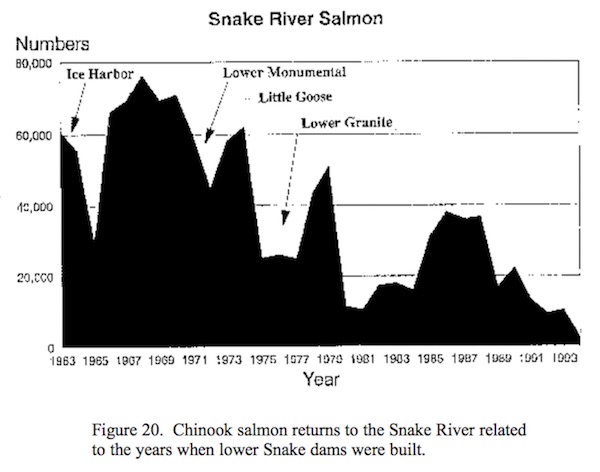forum
library
tutorial
contact

Can't Afford to
'Breach First and Answer Questions Later'
by Kurt Miller
Idaho County Free Press, January 17, 2021
|
the film forum library tutorial contact |

|
Can't Afford to
by Kurt Miller
|
 While many words have been used to describe 2020 -- unprecedented, historic, apocalyptic -- I believe the best word to describe 2020 is "humbling."
While many words have been used to describe 2020 -- unprecedented, historic, apocalyptic -- I believe the best word to describe 2020 is "humbling."
Who could have predicted COVID-19, travel bans, statewide lockdowns, nationwide protests, extreme wildfires, economic tumult?
As we begin the New Year, it's safe to assume most of us are a bit more hesitant to predict what the future will look like.
I, for one, am hopeful that we can all bring this more modest perspective to public policy. Near the beginning of the public lockdowns in 2020, I called into all six federally hosted public meetings on the future of those dams. The vast majority of the callers were absolutely certain the only way salmon and orcas could be saved is by breaching (i.e., dismantling) the lower Snake River dams.
They also found strong agreement amongst each other that these dams are "decrepit," "losing money," the cause of the Bonneville Power Administration's likely financial ruin, the reason the Snake River is hot in the summer, and the list goes on.
These strongly-worded claims were often asserted despite significant countervailing evidence.
Fast forward eight months, when I joined the Idaho Salmon Workgroup virtual meeting in early-December. One commenter announced that anyone who didn't agree about dam breaching was "ignorant and pitiable". Another exclaimed that those who disagree will find themselves on the "wrong side of history."
In making my own comments, I tried to reflect the humbling lessons of 2020. I began by acknowledging the coincident timing between salmon declines and the completion of the last of the lower Snake River dams.
I also shared a different way of looking at things. I pointed out that during this same 50-year time frame that rivers up and down the Pacific Coast of North America have seen very similar salmon survival declines. These declines include free-flowing and nearly pristine rivers.
It is a phenomenon that NOAA Fisheries scientist Lisa Crozier described as the "near-synchronous decline" in worldwide salmon populations, likely due to climate change and its effect on oceans.
A future without salmon and steelhead is clearly not acceptable, but what if climate change is the driving factor? In that case, removing 1,100 average megawatts of renewable power probably isn't a good idea – especially if that energy resource is relied on to help balance intermittent generation like wind and solar power.
We also cannot pretend that breaching the lower Snake River dams would occur without serious socio-economic repercussions. Reputable studies on the energy replacement costs for those dams range from roughly $300 million per year to $900 million per year for 20 years. These higher costs would be passed on directly to electricity customers.
When you add that cost to the hundreds of billions of dollars it will take to remove and replace the region's fossil-fueled power plants with carbon-free resources, one has to ask how much the average electricity customer can afford to pay. What about disadvantaged communities? How would such a cost increase impact the already-high energy burdens that they carry?
The point is, we can't afford to "breach first and ask questions later." 2020 has taught us all that we need to approach the future with humility. My true hope for 2021 is that we can work together for salmon recovery with this thought in mind.
learn more on topics covered in the film
see the video
read the script
learn the songs
discussion forum
